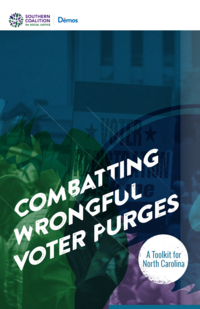What is a Voter Purge?
When a state or county conducts a program to systematically remove people from its list of registered voters, this is called “voter list maintenance.” When done properly, these programs can increase the accuracy of voter rolls by removing people who pass away, no longer live in the state, or have become ineligible for other reasons. However, overly aggressive removal of voters has also become a key strategy for politicians and political operatives trying to suppress the vote. These types of removals can disenfranchise eligible voters, are sometimes unlawful, and are commonly referred to as “voter purges.”
Wrongful voter purges undermine the right to vote and often target and disproportionately impact voters of color, low-income voters, and young people. In addition, wrongful purges can impact election results, especially in state and local elections decided by a small number of votes.
The challenge to combating wrongful purges is that many residents do not find out they were purged from the voter rolls until they are trying to cast their ballot. At that point, it can be too late to fix the problem.
This toolkit helps advocates and local leaders:
- Understand how and when Boards of Elections conduct voter list maintenance and update the voter rolls;
- Spot and get ahead of wrongful purges; and
- Report and fight unlawful purges.
Download the toolkit here
Learn more at the Southern Coalition for Social Justice
